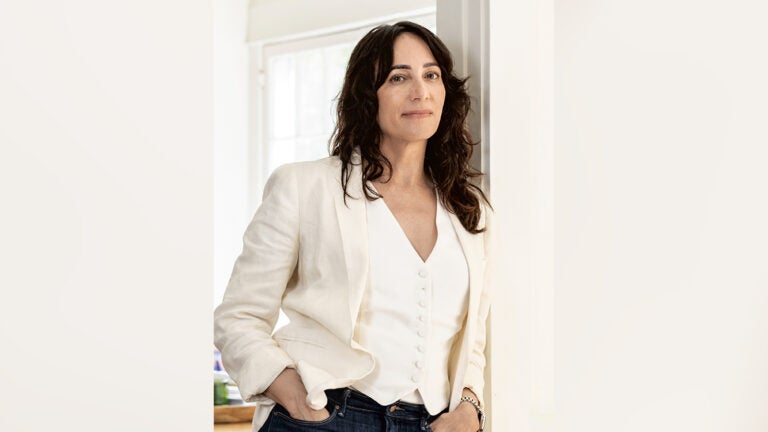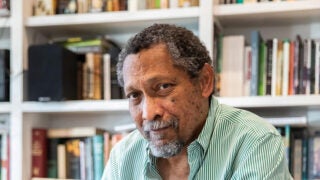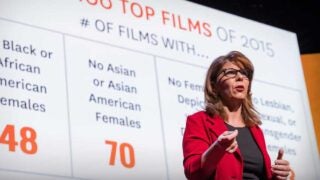
Danzy Senna’s latest novel is Colored Television. (Photo/Dustin Snipes)
Danzy Senna on why this election season feels like ‘Groundhog Day’ for mixed-race people
The author and USC Dornsife professor explores how political discourse misses the mark on the mixed-race experience in the United States.
Complex conversations about the reality of being mixed race in the United States are nothing new to author Danzy Senna, a professor of English at the USC Dornsife College of Letters, Arts and Sciences. In her latest novel, Colored Television, Senna tells the story of an author who embarks on a 10-year journey to write the “mulatto War and Peace” and encapsulate the mixed-race experience in a way she’s never seen done before — with chaotic results.
With the current election cycle’s persistent misinformation about Vice President Kamala Harris’ multiracial upbringing, Senna — who is also biracial — finds herself being once again tapped by the media to explain the existence, and erasure, of her people in political discourse. In this abridged interview, Senna shares her experience challenging ideas around race in the United States and why this election season’s discussion on Harris’ background might feel like Groundhog Day for mixed-race people.
You’ve mentioned that editors rejected your first novel, Caucasia, multiple times before it was finally published. Since then, that novel and your subsequent others — also about mixed-race narratives — have seen success. Is the subject matter more relatable now?
I was part of the first wave of biracial children to be born out of the movements of the late ’60s, including integration. I was born two or three years after the Supreme Court decision striking down anti-miscegenation laws. It was a very big historical shift. When I published Caucasia in 1998, it was flowing out of that moment of me and my cohort coming of age and writing about it.
The sheer numbers have changed the conversation, as well as the inevitability of us coming into our own and writing these stories. But before that we literally didn’t exist, and the last time you had seen a mixed-race character was in the “tragic mulatto” novels of the ’50s. Mixed-race people are the fastest growing population in the United States, and I think the publishing world and the film world are catching up with that, finally.
Interviewers often ask you why your novels continue to feature mixed-race protagonists and plot lines. Why do you think people ask you that question?
The white male position is still considered the universal in our imagination. We think it is not racialized, or it’s not gendered, to write about a white male. But of course it is. On the other hand, mixed-race people are still seen as being inherently limited by our racial lens. We are seen as an anomaly and a situation and not an actual perspective. And so, what you hear in that question is the erasure of an entire history and population. It implies that we are not real — that we don’t exist — which of course is built into all the stuff I’m writing about. The fact is, to write from a mixed perspective doesn’t feel limiting in the way that I think is implied in that question. It feels as specific and as expansive as any other.
In a 1998 essay, you declared the year 2000 to be the “Year of the Mulatto.” What would you call this year?
That was a very tongue-in-cheek article about the sudden trendiness of being mixed race at that time. We’re now sort of up for debate as to whether we are actually Black or not, whereas when I grew up in the ’70s and ’80s, if you had a Black parent, you were Black, no matter how you presented. Now I think that’s much less given, and there’s a lot of conversations about who gets to claim Blackness.
And why do you think that is?
We’re very far from these historical precedents that made this category so expansive. We’re far from the one drop rule of slavery, and we’re far from the Black Power movement that defined Blackness through this lens of expansion and openness. We’ve even had some people of mixed race declare themselves not to be Black, very much wanting their own category — as well as some white people who have claimed Blackness, who don’t have any Black heritage. For me, it’s just more material because it’s an endless conversation that keeps shifting.
In Colored Television, a sociologist character says that “the mulatto will always be the first mulatto to have ever lived.” This is reminiscent of the debate around Blackness and mixed-raceness that followed President Barack Obama throughout his presidency — and that has now been reignited with Vice President Kamala Harris’ run for the presidency.
Donald Trump’s questioning of Kamala’s race felt familiar. He was saying things I’ve heard my whole life. I’ve been writing about this for so long and thinking about it so long — it feels at times like Groundhog Day to be mixed race. You’re like, “Wait! Didn’t we have this conversation 40 years ago? Do I literally have to explain this to people every time I enter a room for the next 100 years?” It’s a wild thing to be Black-white mixed in this country and feel this sort of strange repetition. I think that has to do with the way that we are seen as a predicament, not as a people.
There’s another line from the sociologist in the book, where he says, “The mulatto doesn’t fit into any of the stories we’ve told ourselves about America.” Do you think that’s relevant to our current political and cultural climate?
I do. We’re still living with a fantasy of a racial binary in this country. Even, for example, in the way that studios figure out how and to whom a movie is going to be marketed: They show it to Black test audiences and then show it to a white audience. They’re still thinking these are separate categories. It is how capitalism functions. Even those polls we see about who’s voting for whom, we see it broken down by race. It’s just the endless erasure of people of mixed race in every single element of American life and conversation. We lack representation. And yet, we’re also sort of hyperrepresented in superficial ways — they love a light-skinned, curly-haired woman in all these movies or Target commercials — but our actual realities are underrepresented.
You’ve also spoken about how presenting closer to whiteness has allowed you to sit in on some intense conversations. Could you talk about that? This idea of almost being a spy in these situations where you get to hear people’s true thoughts on race.
People often assume that if you present to the world as white, that you’re going to identify more as white — that you will not have a very strong Black identity. But actually, sometimes it happens that if you are a mixed person who walks through the world presenting as white, your Black identity becomes more clear to you because you are always having to hear these unfiltered expressions of racism from people who don’t know you are Black. Having been raised in a highly politicized atmosphere in a very segregated city, my experience of unwittingly passing for white was not one that made me feel closer to whiteness. It did the opposite. It made me feel much clearer on where I stood in that moment, where you really did have to take a stand on one side or the other.
What impact, if any, do you think this election will have on the conversation around mixed-race identity?
I hope this hypervisibility of someone of mixed race inevitably will impact people’s thinking. The world may be forced to acknowledge that we exist, first and foremost. Kamala Harris will be inhabiting the most central and powerful position in the world. The fact that she’s a woman is as significant as is the fact that she’s of mixed race and has this complex set of histories and cultures that she’s carrying in her.
I totally understand [Harris] — I could see it on her face when people ask her about her racial identity — her deep exhaustion and deep reluctance to become the spectacle and the spokesperson of this position. I respect that because I think she knows it’s a trap, and she doesn’t want to walk into that trap. But whether she likes it or not, she is creating a conversation around her that is interesting and will speak to the fact that so many people are like her. She’s not an anomaly. She comes from a very quintessentially American identity — both as a child of immigrants and a child of mixed race. This is, and always has been, America.



